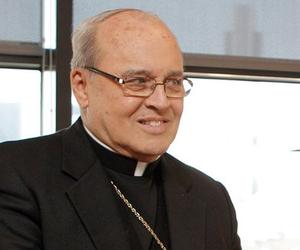Cuba’s Catholic magazine "Espacio Laical" blasts critics of Cardinal Ortega
- Submitted by: lena campos
- Religion
- 05 / 24 / 2012

The Catholic magazine says there’s a campaign to get rid of Cuban Cardinal Jaime Ortega because he’s too close to Cuban leader Raúl Castro.
Unidentified factions want to “eliminate” Cuban Cardinal Jaime Ortega, according to an editorial in a Havana Catholic magazine that defended the controversial cardinal furiously and accused some of his critics of having “very little political intelligence.”
Neither dissidents nor exiles have “clear and universal projects for the destiny of the nation” and some are following “agendas dictated from abroad,” according to the editorial Tuesday in Espacio Laical, (Lay Space) run by the Lay Council of the Havana Archdiocese.
The archdiocese’s own magazine, Palabra Nueva, published an editorial last week defending Ortega from harsh complaints that he has become a virtual partner in Cuban ruler Raúl Castro’s efforts to preserve the communist system while reforming the economy.
But the Espacio Laical editorial went further, all but arguing that Ortega alone has the right answers to Cuba’s problems and either harshly dismissing his critics or accusing them of some sort of inappropriate conspiracy against the prelate.
“Certain factions” have developed a plan “with the purpose of eliminating the cardinal and erasing the political line he has promoted,” the editorial alleged, without identifying the factions or providing details of the supposed plan.
“It is not just a matter of personal attacks … but of a war against an entire evangelical line that aspires to changes that are positive and serene, gradual and inclusive, orderly and peaceful,” the editorial added.
The editorial spared no praise for Ortega, saying he played an “outstanding role in the preparation of all Cuban church documents over 30 years, and interceded for the liberation of “thousands” of prisoners beyond the 125 political prisoners freed by Castro in 2010-2011.
Ortega also spoke out against abuses like the 1989 execution of Army Gen. Arnaldo Ochoa on dubious drug charges and the government’s sinking of the tugboat 13 de Marzo in which more than 30 would-be refugees drowned, it recalled.
But for Ortega “the definitive solution for Cuba will pass through a political methodology marked by encounters, dialogue and consensus,” the editorial added, although the Castro government so far has met only with Ortega and refused to meet with dissidents.
The church “cannot agree to projects in many cases tied to agendas monitored and dictated from outside the island, or without a clear criticism of the blockade (the U.S. embargo) against our homeland,” it added.
“That is why (Ortega) is not accepted by many who, full of hatred and prejudices and in some cases even with very little political intelligence, prefer to topple the current government and achieve a triumph that again excludes the adversaries,” according to the editorial.
“This type of victory could lead us to political and economic change, but not toward the national balance we need,” it continued, “because many times its promoters seem bent on excluding all those who … support or have supported the leadership of the revolution.”
While toppling the Castro government “could carve new electoral mechanisms, which perhaps could satisfy certain political sectors,” it argued, any such new mechanisms will “fall short of a true democratic and reconciliation content.”
The editorial also included some criticisms of the Castro government, saying that while the Church favors his economic and social reforms, the government is moving too slowly and failing to “develop a project for an inclusive country where all Cubans can fit.”
It also criticized “contentious and divisive” policies “implemented during decades by the government and the opposition,” and said it opposed “messianic campaigns, government and opposition, that try to proclaim themselves as the lone voices of civil society.”
The editorial was titled “Commitment to the Truth” and was signed by the four members of Espacio Laical’s editorial board: José Ramón Pérez, Roberto Veiga, Lenier González and Alexis Pestano.
Source: Miami Herald.com
Comments